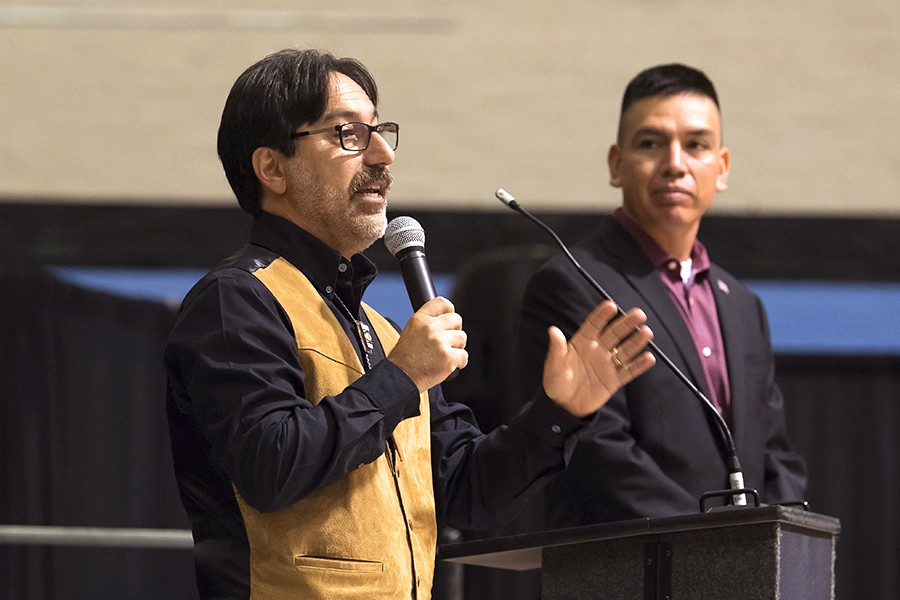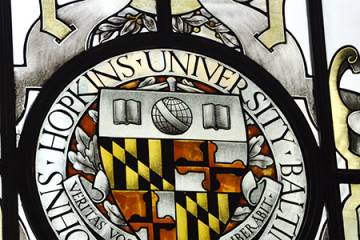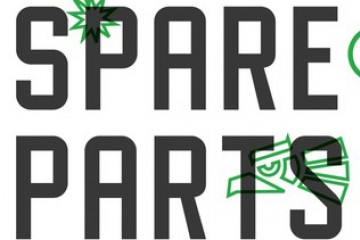It's easy for Oscar Vazquez to identify the most crucial turning point of his life.
By now that experience—a high school robot-building challenge—has been immortalized in a book and three movies. The robot itself, dubbed "Stinky," has been displayed at The Smithsonian.
The attention started with a 2005 Wired article with a catchy headline: "How 4 Mexican Immigrant Kids And Their Cheap Robot Beat MIT".
Vazquez' role in that underdog victory 13 years ago, at a college-level marine robotics competition, helped lead to a college scholarship and a mechanical engineering degree. His career since has included a combat tour in Afghanistan and programming for BNSF Railway. And his photo album is rich with moments like meeting the Obamas and parachuting out of military planes.
"A lot of doors opened up for me," Vazquez said at a visit to Johns Hopkins University on Thursday night. He appeared alongside the teacher, Fredi Lajvardi, who coached the 2004 robotics team at Carl Hayden Community High School in West Phoenix.
As part of Hopkins' Common Read program, students in the Class of 2021 learned about the story through the book Spare Parts: Four Undocumented Teenagers, One Ugly Robot, and the Battle for the American Dream.
The author of that book, Joshua Davis, is the same Wired writer who helped the Phoenix high-schoolers become a national inspiration with his 2005 article.
And Davis returned to topic again this week—this time responding in Wired to the Trump administration's announced plan to phase out the Deferred Action for Childhood Arrivals program, also known as DACA.
In his article, Why Trump Should Welcome Dreamers, Davis heralds the former Carl Hayden students as "the kind of young people our country needs" but risks losing with the potential end to DACA, which currently protects about 800,000 young undocumented immigrants from deportation.
Though Vazquez ultimately found legal status in the U.S. via marriage and a green card, he told Hopkins students about the obstacles in his path before that. For example, during his junior year at Arizona State University, a change in state law halted scholarships for undocumented students.
"One way or another, the community came together and we were able to raise enough for me to continue my education," Vazquez said.
But even once he graduated, he found opportunities limited "with a degree but no documents," he said. He opted to self-deport to his home country of Mexico in order to re-enter the U.S. legally—but found barriers in that process.
Remaining in Mexico for about a year, apart from his wife and infant daughter in Phoenix, Vazquez worked in an auto parts factory. With his English and engineering skills, he rose quickly to become a supervisor.
"They couldn't take that education away," Vazquez said last night, offering that as advice for any DACA students who could find themselves returning to their home country. "Do you want to go back as a gardener or construction worker, or do you want to go back as an engineer or an architect?"
Lajvardi, an immigrant from Iran who has now taught at Carl Hayden for more than 25 years, encouraged DACA advocates to focus less on "one-off" events like protests—which can create a false sense of achievement—and more on prolonged engagement with politicians.
"Email your senators. Email every senator in the United States Senate," Lajvardi said. "They may not look at your individual email, but they will know which way their population sways."
Vazquez framed the issue in practical economic terms.
"This affects 800,000 people. That's a lot of people who are actively working, … a lot of people who are contributing to the economy and providing something positive to the country," he said. "So think again if you think this won't affect you."
Posted in Arts+Culture, Student Life, Politics+Society
Tagged immigration, class of 2021










